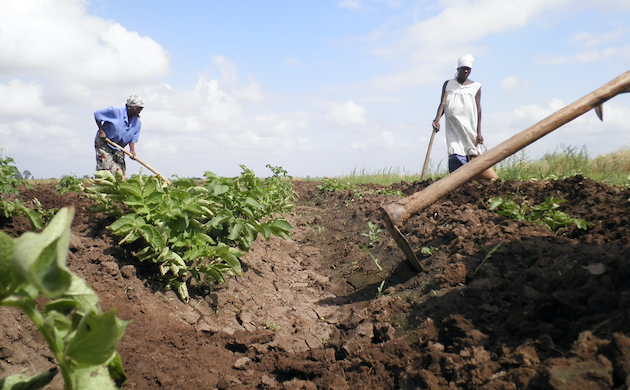Promoting Innovation & New Technologies — Global Issues
NEW YORK, Dec 20 (IPS) – Promoting innovation and technology to promote inclusive development means using new technologies to enhance equal access to services, eliminate discrimination, increase transparency, and create a stable and just future for all – especially the most vulnerable and marginalized.
Obviously, the rule of law is a key driver of inclusive, equitable, and sustainable development, and empowers people from all strata of life to seek and obtain justice. Doing more with less is posing a challenge here. We are operating in an increasingly connected yet complex global and national settings and fiscally fragile environment.
Our traditional structures, systems and processes are proving to be inadequate to deal with new developmental challenges, pandemics, inaccessibility and exclusions, conflicts, and humanitarian crisis. Our governance and justice systems are not the most transparent and data friendly domain. Bringing that information to light is no easy task.
Barriers to Governance and Rule of Law
As indicated before, there are many barriers to accessing public services and ensuring accessible public health, rule of law, especially where there are high levels of poverty, marginalization, and insecurity. Governance institutions – formal and informal – may be biased or discriminatory. Public governance systems may be ineffective, slow, and untrustworthy.
In the last 3 years of pandemic, we also realized our public health system is often crippled by lack of investment, inclusive and accessible initiatives, and innovation. Discriminatory decision making and exclusivity further complicated the situation at all levels. People may lack knowledge about their rights.
Often legal assistance and consumer protection are out of reach, leaving people with little recourse to formal mechanisms for protection and empowerment. There may be a culture of impunity for criminal acts, unacceptable level of tolerance for exclusionary practices.
Other discriminations, injustices, and abuses in the family, or through deprivation and labour exploitation, may go unaddressed. Despite all these, more can be done to ensure that they benefit from the inclusive governance and public health work, and, rule of law practices, which expand their opportunities and choices.
Quest for New Ideas …
Despite all these, more can be done to ensure that the most vulnerable and disadvantaged groups benefit from inclusive public health, legal empowerment, and access to justice, which expand their opportunities and choices.
We need fresh ideas, resources, and unconventional ways of collecting and analyzing data, such as using micro-narratives or innovative, accessible public hearings, targeted consultations, to complement traditional mechanisms including surveys. But innovation is rapidly becoming the new buzzword, so I would be careful in applying it here:
- • Innovation is not cost-free and takes time so it should be mainstreamed:
• Innovation is both science and arts. And it should be seen as a standalone practice. one of the biggest problems that public sector innovation faces today is that governments have de facto created a ‘class of innovators,’ rather than making innovation an inclusive process that is open to anyone who has the motivation and capacity to influence change. This must change.
• Repackaging or reproduction is not innovation unless it caters to the specific needs of vulnerable and marginalized communities which are not supported by existing mechanisms and services.
• What is innovative in Bangladesh, Turkey, and Tanzania may not be so in India, Turkmenistan, Senegal, or Mexico;
• Big data is important but harnessing it for the right cause should be central consideration. Linking it with better evidence base is of critical significance. The COVID-19 challenges amply demonstrated it.
• Going beyond social networking is key – while Facebook, Twitter and other Social Media outlets play an admirable role in connecting people, these are not enough to solving a protracted problem and sustaining a solution. We must also be mindful of the recent trend of using social media to silence public defenders, journalists, and whistle blowers. The twitter is a case in point (December 2022).
• Innovative ideas, while refreshing, need to be pragmatic so that they can be implemented. They mast be part of a solution, not the overall problem.
• Evidence of impact is more important than the novelty factor.
Innovation and New Technologies for Solutions
My own take is that ideas do not need to be always transformational or revolutionary. Our platforms can replicate or even recycle what already works by introducing successful models to new actors and environments.
Even seemingly ordinary things can become innovative in different terms, approaches, or settings. linking inclusion to innovation is not only about looking at how it can advance policies and create better impact for governments, but also about giving people, public servants, and citizens alike, the self-efficacy, power, and freedom to direct change in the way they see necessary. This contributes directly to the making of inclusive development.
New technologies are changing the lives of people around the world. In the same way that they make daily tasks simpler, they can make official and routine interactions with government institutions, service providers easier and can provide innovative solutions to a host of public sector governance, public health, and rule of law challenges.
Technology has an immense untapped potential to strengthen inclusive practices for governance including public health governance, and the rule of law. Technological innovation must provide equal access to services, help to eliminate discrimination, and assure more transparency and accountability. They must not be used to silence voices, deny human rights, or create justifications for maladministration, inaccessibility, and exclusions.
As we are approaching 2023 in a few days, let us hope for a more inclusive and diverse public sector governance rooted in human rights values and practices.
Dr. A.H. Monjurul Kabir, currently UN System Coordination Adviser and Global Team Leader for Gender Equality, Disability Inclusion/Intersectionality at UN Women HQ in New York, is a thought leader, political scientist and senior policy and legal analyst on global issues and regional trends. For policy and academic purpose, he can be contacted at [email protected]. He can be followed in twitter at mkabir2011
IPS UN Bureau
Follow @IPSNewsUNBureau
Follow IPS News UN Bureau on Instagram
© Inter Press Service (2022) — All Rights ReservedOriginal source: Inter Press Service
Check out our Latest News and Follow us at Facebook
Original Source






